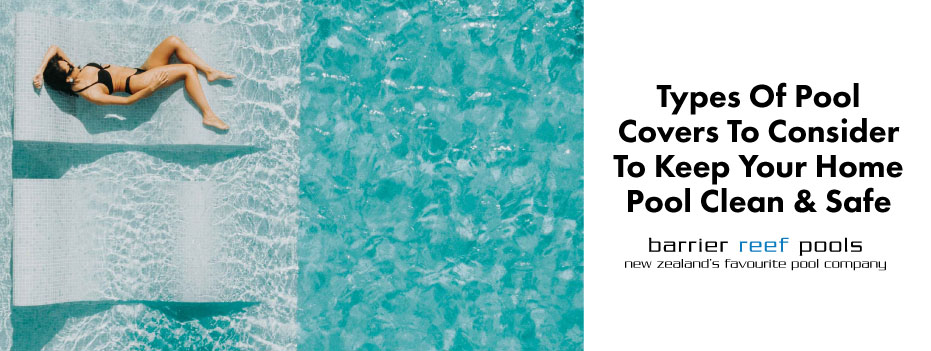Types Of Pool Covers To Consider To Keep Your Home Pool Clean & Safe
Let’s talk pool covers. It’s a pool accessory that’s absolutely integral to your pool’s cleanliness, safety and energy efficiency. Yet, people hardly talk about it. In this article, we explore what different types of pool covers are available for you to choose from and how to select the one that’s perfect for your pool. So, let’s get started.

Type 1: Solid pool covers
Solid pool covers are the most conventional of all pool cover types that you’d find on the market. It’s typically made out of polyvinyl sheets and is thick enough to keep debris from falling into the pool, without tearing. These pool covers are a budget-friendly option because they don’t have any additional bells and whistles. They’re simple to manually pull over your pool and they are pretty durable, lasting for a few years.
The biggest advantage of a solid pool cover is that it protects your pool from all types of debris – no matter how large or small. It’s also a great way to reduce your pool heating costs because the cover can insulate the water pretty well. Overall, the solid pool cover is opaque and thick, making it perfect for UV protection. This in turn keeps your pool tiles from discolouring. The vinyl sheets can last up to 10-12 years if cared for well.
The disadvantage of solid pool covers is that if it rains, the water pools right on top of the cover, necessitating pool cover cleaning and drying. Plus, if something sharp or heavy were to fall on the cover, it’s likely the fabric will tear easily.
Type 2: Winter pool covers
Winter pool covers are a type of solid pool cover that is used specifically for winter. These pool covers are typically made out of tarpaulin sheets – making them much more heavy-duty than polyvinyl solid covers.
The advantage of a winter pool cover is that it’s inexpensive (and easy to replace once it’s worn out). It’s also long-lasting, capable of giving up to 5 years of pool coverage if you take care of it. Plus, you can always use a winter pool cover for your indoor pools, since they warm your water enough to prevent installing a pool heating system. The thickness and solid coverage of the winter pool cover also reduce the risk of algal growth and UV radiation.
The major disadvantage here is that a 5 years lifespan is actually pretty short for a pool cover. Also, if you have an outdoor pool, the winter cover may have a very limited usage to only the winter months. You may need to invest in a second pool cover for the summer months. Just like vinyl solid pool covers, the trap winter cover can’t bear much debris weight and is susceptible to tearing.
Here’s why it’s important to keep your pool area clean during the winter months!

Type 3: Mesh pool covers
Mesh pool covers are made of polypropylene fabric that’s tightly woven, but with pockets of space to create a mesh-like texture. They are designed to stay taut over the water, instead of resting/lying on the surface.
Mesh pool covers are definitely more long-lasting than solid vinyl covers.
...they have a lifetime of up to 15 years!
They also keep large debris at bay by collecting the debris in the mesh spaces/pockets. The tensile strength of this cover is very high, making it perfectly safe to use if your pool is located under a large tree or is prone to getting heavy debris.
The space in the mesh cover allows rainwater, snow melt and dew through to the pool, which is helpful in two ways. For one, this ensures that your pool remains naturally topped up with water regularly, reducing the need to order extra gallons. Secondly, the mesh cover is perfect for maintaining the chemical profile of natural pond-style pools, by allowing nutrients in rainwater to mix with the pool water.
Of course, this very advantage can become problematic if you don’t want a pool that is similar to a natural water body. The mesh cover can mess up the quality of the water, necessitating regular water treatments. Secondly, it doesn’t protect your pool’s tiles from UV radiation, resulting in tile discolouration. Also, mesh pool covers can be more expensive to use because they need special accessories to be installed to put up the mesh in the first place.
Type 4: Hybrid pool covers
So far, we’ve looked at solid covers (and by extension winter covers) and mesh covers. Now, you may be having a hard time trying to decide which of the two types of pool covers to get. If you can’t decide or find that you want one of each, we’d recommend taking a look at hybrid pool covers.
These hybrid pool covers basically function like a solid pool cover when you need to prevent debris from falling into the pool. But the fabric also has a mesh-like texture that lets precipitation into the pool, like a mesh pool cover. It does offer some degree of protection from UV rays and does prevent algal growth. It’s also a great all-season pool cover because of the unique way it is constructed. Plus, these pool covers have a lifespan of 15-16 years, making them worth spending on.
Of course, the fact that it has so many amazing features means that hybrid pool covers are actually very expensive. These are the most expensive types of pool covers, in fact. Plus, you’ll need to spend extra on putting in the required installation set-up to hold up your hybrid pool cover.

Type 5: Automatic pool covers
Till now, all the pool covers we discussed were manually operated. But the final pool cover on our list is the automatic pool cover. This is a fully automated, state-of-the-art pool cover that can be both controlled by a remote and pre-programmed to close at a particular time. The functionality of automated pool covers depends on the brand you choose and how tech-heavy it is.
These automatic pool covers are great if you don’t want the hassle of removing and putting back the pool cover every day. Plus, you can make the equipment cover only part of the pool, allowing you to use the other, open section.
Another advantage of automatic pool covers is that they can be designed to mimic the decking and tiling of your pool, so the aesthetics of the pool area are maintained. But despite all these advantages, there are some problems with automatic pool covers.
For one, you need to call qualified pool cover installers to set up your pool cover. If something is faulty with the cover, there’s no way to manually pull it over your pool. The cost of installation is very high – even higher than hybrid pool covers. Add to this cost of repairs and maintenance, and you have yourself a very expensive pool cover at home.
Finally, if you ever decide to get rid of this pool cover and replace it with a manual cover, you’ll need to get your installer to come in and disassemble both the automatic pool cover and any other additional installations they had set up around your deck.
To Conclude - How to choose the ideal pool cover for you?
Ultimately, the choice of a pool cover boils down to the following questions –
- What is the goal with your pool cover –reducing electricity consumption, pool safety, better water sanitation, reducing additional water fill-ups, less exertion when using the cover, or all of them?
- How much is your budget for a pool cover?
- How much effort do you want to exert in using your pool cover every day?
- Are you willing to spend on extra accessories and construction to support your pool cover?
- Do you plan on changing your pool covers in the future?
Our team of experienced pool installers can advise you on the type of pool cover that best fits your family, lifestyle and budget. Reach out to us today to discuss your pool installation and pool maintenance needs. We look forward to making your pool experience safe and comfortable.

